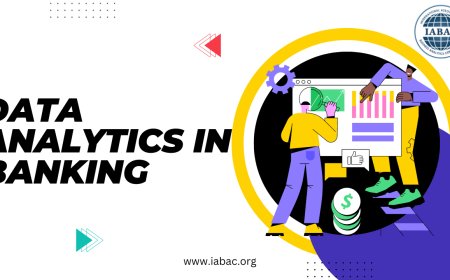The Benefits of a Data Analytics Certification
Unlock career opportunities with a data analytics certification. Gain valuable skills in data analysis, visualization, and decision-making.

Businesses are depending increasingly on data-driven information to inform their strategic decision-making, which is driving up demand for data analytics specialists. The fast growth of digital data from diverse sources has made it necessary for organizations to hire experts who can glean useful data from complicated datasets. To find trends and patterns that promote company expansion, these experts use statistical analysis, programming languages like Python and R, and data visualization methods.
A wide range of industries, including technology, retail, healthcare, and finance is utilizing data analytics. This opens up a lot of chances for anyone working in this industry. The need for flexible data analytics professionals is expected to grow as technology develops, offering an exciting future for people who care deeply about using data to solve problems and make decisions.
What are the Benefits of a Data Analytics Certification
Certification in data analytics certifies skills for hiring managers, improving the potential for professional advancement through increased pay and possibilities. It provides continued education, professional networking, and industry recognition, identifying you as a qualified professional.
Validation of Skills:
-
A data analytics certification points to your capacity to analyze data using several kinds of methods and tools. It shows to possible companies that you possess the abilities needed to successfully manage challenging data analysis assignments.
Career Advancement:
-
Gaining a data analytics certification improves your chances of landing a better job and developing professionally. When hiring for data-related professions, employers frequently give preference to employees who have certifications, offering higher compensation and chances for internal promotion.
Continuous Learning:
-
The subject of data analytics is constantly developing, with new tools and methods appearing regularly. Through opportunities for ongoing education, certification programs keep you abreast of the most recent advancements and trends in the profession.
Networking Opportunities:
-
By pursuing certification programs, you may develop relationships with peers, mentors, and business experts among other professionals in the sector. Developing a strong professional network can lead to future job opportunities, knowledge sharing, and working together.
Industry Recognition:
-
Having a certification in data analytics shows that you are committed to both professional growth and excellence. It identifies you as a skilled and informed professional in the field of data analytics, increasing your reputation in the eyes of colleagues and employers.
What are the Key Advantages of Holding a Data Analytics Certification?
-
Improved Skills: You can go deeply into the field of data analysis by earning a certification in data analytics. You'll pick up useful skills and resources that will aid in the efficient manipulation, interpretation, and visualization of data. Because these skills are highly sought after in many kinds of industries, employers will find you to be a more adaptable and useful resource.
-
Career Advancement: Strong data analytics skills are in high demand among businesses due to the growing dependence on data-driven decision-making. Having a certification in this field can greatly improve your resume and set you above the competition when you apply for employment or want to advance in your current position.
-
Credibility and Trust: A data analytics certification is a concrete indication of your expertise in the industry. It proves to possible employers, clients, and colleagues that you have completed thorough education and possess the skills needed to successfully manage challenging data analysis projects. This can increase credibility and trust, creating doors for professional development.
-
Stay Relevant: Data analytics is a field that is always changing, with new methods, tools, and strategies appearing regularly. You may show your dedication to being current with industry trends and improvements by pursuing a certification. This flexibility is valued greatly by employers and can help you remain relevant in a rapidly changing job market.
-
Networking Opportunities: Numerous data analytics certification programs offer chances for students to network with teachers, industry experts, and other students. Developing a strong professional network of contacts can lead to future job possibilities, career guidance, and useful information.
-
Higher Earning Potential: Because their expertise is in high demand and their talents are specialized, data analytics specialists usually get well-compensated. Having a certification may increase your earning potential because it shows that you are proficient in a highly sought-after skill set.
Earning a certification in data analytics has many benefits. It improves abilities, expands job opportunities, establishes reputation, maintains relevance in a subject that is evolving, makes networking simpler, and raises earning potential. All things considered, earning a certification is an important investment for success in the data-driven industry.
Quick developments in data analytics tools and technology
-
Rapid Evolution: The technology and tool environment for data analytics is evolving quickly, with new developments appearing frequently.
-
Diverse Advancements: These developments cover an extensive range of data analytics topics, including improvements in hardware infrastructure, software platforms, and algorithmic techniques.
-
Introduction of New Tools: Professionals who analyze data have access to a greater range of functions and capabilities thanks to the ongoing release of new tools and platforms. These technologies frequently simplify data manipulation, visualization, and interpretation procedures, allowing for more effective and perceptive study of intricate datasets.
-
Integration of Advanced Technologies: Particularly, data analytics solutions are increasingly incorporating cutting-edge technology like artificial intelligence and machine learning. With the help of this connection, analysts may now use complex models and algorithms for a variety of activities, including pattern recognition, anomaly detection, and predictive analytics.
-
Importance of Staying Updated: For those working in the area, keeping up with the most recent advancements is a must in this ever-changing environment. Staying up to date with new tools, methods, and technology helps people adjust their skill sets, simplify their processes, and stay competitive in a field that is always changing. Additionally, by keeping up to date, practitioners can fully utilize data analytics to support well-informed decision-making and accomplish strategic corporate goals.
Obtaining a certification in data analytics has multiple, significant advantages. Those who gain this certification improve their abilities and employment prospects, as well as their credibility, relevance in a profession that is changing quickly, ease of networking, and earning potential. Professionals in the field of data analytics must keep up with the rapid improvements in technology and technologies that are changing the environment of this sector. All things considered, obtaining a certification in data analytics is an essential investment for success in the data-driven sector of today, providing a route to ongoing development and progress.











































